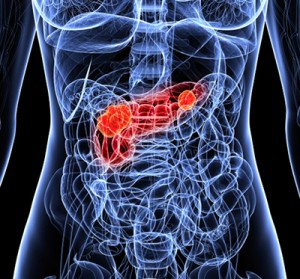- Pancreatic cancer is the fourth leading cause of cancer deaths
- 45,000 a year are diagnosed with pancreatic cancer and 38,000 will die from it
- The injectable diabetes drug, Byetta, may cause an increased risk of pancreatic cancer
- The diabetes drug, Sitagliptin (marketed as Januvia and Janumet) may cause an increased risk of pancreatic cancer in patients
- Drugs that mimic GLP-1 like Victoza may cause a the same type of increased risk
Studies Linking Diabetes Drugs to Pancreatic Cancer
 There is a new study that underscores the increased dangers of certain diabetes treatments. A study published March 22, 2013 in the journal “Diabetes,” provides evidence of increased precancerous changes such as dysplasia in the pancreata (pancreases) of diabetic patients using GLP-1-mimicking (incretin) diabetes drugs such as Byetta (exenatide), Victoza (liraglutide) and Januvia / Janumet (sitagliptin), compared to pancreata from diabetics not using these drugs or those from non-diabetics. These findings are in accord with the rapidly increasing number of reports to the U.S. Food and Drug Administration (FDA) of pancreatic cancer in patients using these drugs compared with diabetics using other drugs for diabetes.
There is a new study that underscores the increased dangers of certain diabetes treatments. A study published March 22, 2013 in the journal “Diabetes,” provides evidence of increased precancerous changes such as dysplasia in the pancreata (pancreases) of diabetic patients using GLP-1-mimicking (incretin) diabetes drugs such as Byetta (exenatide), Victoza (liraglutide) and Januvia / Janumet (sitagliptin), compared to pancreata from diabetics not using these drugs or those from non-diabetics. These findings are in accord with the rapidly increasing number of reports to the U.S. Food and Drug Administration (FDA) of pancreatic cancer in patients using these drugs compared with diabetics using other drugs for diabetes.
Reports from the FDA’s electronic adverse reaction database (AERS) of pancreatic tumors, almost all being cancer of the pancreas, in patients in whom these three drugs were listed as the primary suspect drug for the tumors. There were a total of 292 reports of pancreatic tumors between January 1, 2010, and June 30, 2012, for these three incretin drugs, but only one report for glipizide, an older diabetes drug not in this family. For some of the drugs, especially Victoza, these reports came from other countries as well as the U.S.
It seems clear that all of the drugs in this family are associated with an increased risk of pancreatic cancer and their use should be taken serious.
Information on Pancreatic Cancer
Unfortunately, pancreatic cancer is difficult to diagnose, and the diagnosis is often made late in the course of the disease. Early detection of pancreatic cancer is essential and will greatly improve a person’s chances of surviving the disease. As such, people that have taken the drugs Byetta, Januvia, Janumet or Victoza, especially those with symptoms of weight loss, dark urine and clay-colored stools, back pain, and jaundice, should seek advice from a qualified medical professional as to if they may have pancreatic cancer and what symptoms they should be aware of to detect any early onset of pancreatic cancer.